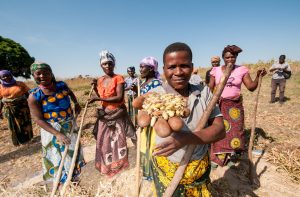Reliable, timely data are crucial to making strategic investments and designing cutting-edge policies in food and nutrition security, yet such data are often lacking in developing countries. To fill this gap, the International Fund for Agricultural Development (IFAD) and the International Food Policy Research Institute (IFPRI) teamed up with other partners to build real-time tools to guide public investments and drive inclusive rural transformation.
In 2005, IFAD gave IFPRI a grant to analyze different rural regions in Ecuador. The aim was to develop solutions to help smallholder farmers overcome market and institutional barriers, such as lack of access to credit. IFPRI developed an innovative and practical policy-making tool—a typology that analyzes and ranks rural development projects and interventions based on their risks, potential impact on poverty, and costs. Funds are then allocated by the government to the current top-ranking projects and interventions, optimizing the government’s budget while addressing poverty and rural development. In 2009, IFAD and IFPRI presented the results to the heads of the National Public Investments Systems for Latin America during their biannual meeting in Peru. IFPRI and partners are planning a regional workshop to present the framework of the typology to ministries of finance and agriculture in Central America in 2016.
IFAD and IFPRI both contribute significantly to the Agricultural Market Information System (AMIS). AMIS is an inter-agency online resource that encourages major players in agrifood markets to share data, best practices, and methodologies across the main producing, consuming, and exporting countries of four important crops: maize, rice, soybeans, and wheat. Its secretariat is housed at the Food and Agriculture Organization of the United Nations (FAO) and is formed by numerous international organizations. IFPRI’s most substantive contribution to AMIS is the Excessive Food Price Variability Early Warning System, one of AMIS’s early warning systems, which gives policy makers daily visual alerts when world markets are experiencing excessive food price fluctuations. IFAD provides its in-country networks and expertise to make AMIS indicators, data, and analyses more relevant to governments and rural poor people.
In 2012, IFAD, the Bill & Melinda Gates Foundation, the Netherlands, and the United States Agency for International Development funded the IFPRI-facilitated project Technical and Capacity Strengthening Support for Country-Level Strategic Analysis and Knowledge Support Systems (SAKSS) in selected African countries. This project sets up in-country networks to support continuous data and evidence generation to improve the design and implementation of agricultural programs and interventions in African countries. The crucial first step to establishing the networks was to conduct a thorough assessment of each country’s analytical and capacity needs. Twelve countries have completed this assessment, and by 2015, networks were successfully established in 10 countries: Benin, Democratic Republic of the Congo, Ethiopia, Ghana, Mozambique, Rwanda, Senegal, Tanzania, Togo, and Uganda. Twenty-one eAtlases—mapping tools presenting disaggregated and high-quality data on agricultural, socioeconomic, and biophysical indicators—were developed for all existing and upcoming country SAKSS. Through this project, IFPRI, IFAD, and other partners are helping promote evidence-based decision making in these African countries.
For more information on IFPRI's work in partnership with IFAD, please go to this brochure.



